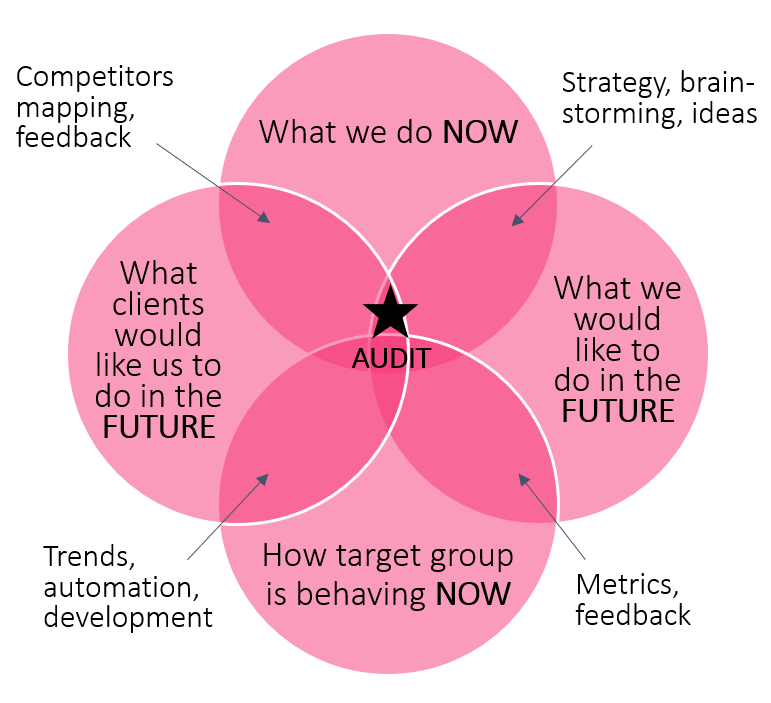Measuring success with numbers is relatively easy if you know what metrics are relevant to your business. But not everything can be described in numbers, and to make matters worse, the global pandemic has caused a lot of chaos and invisibility in being able to see immediate results. In this post, we'll talk about auditing: why it is necessary to perform an audit, and how and what to measure to determine the success of your marketing.
Audit of activities
A leader of any organization must understand what kind of knowledge and information affect and support their daily decision-making process, even on a subconscious level.
The answers to the following questions can help you to determine this:
- Where and how do I get the information I need to make a decision?
- What are the reliable sources of information for my business?
- How often do I need information provided by the market?
Dealing with these questions will increase leader's performance more than one may initially think. In order to monitor the company's marketing progress, it is also important to check the information and the market situation on a regular basis in order to discover areas that can be improved or developed, or that should be abandoned altogether.
What often prevent us from optimal performance and time management are challenges and stress caused by information overload, distractions and multitasking.
Therefore the first task of any leader is to prioritize and systematize daily activities. This helps to avoid overload caused by work. Avoiding distractions, interruptions, and stray thoughts allows you to stay calm, focus on what's important, and become more effective. It creates a good soil for making a well-informed decision.
Multitasking
Did you know that for many years doing multiple tasks at once was considered a good skill, but now we have come to the point where doctors warn of the dangers caused by multitasking? Dr. Paul Hammerness, psychiatrist at Harvard Medical School, and Margaret Moore, the CEO and coach of The Institute of Coaching, both authors of the book „Organize Your Mind, Organize Your Life”, say that multitasking increases the chance of making mistakes and often causes lack of necessary information.
Leaders who multitask on daily basis lose their creativity, critical thinking and problem solving skills.
Principles of marketing audit
Conducting audits on a regular basis is important as it provides crucial feedback and helps you to see the connection between marketing activities and their consequences. An audit can be very extensive and time-consuming, especially when you opt for outside experts. But to support your marketing management and decision-making, you can also conduct audits in a matter of hours, using only the most relevant and readily available indicators. It immediately helps you to understand if you are moving in the right direction or if you have to make an in-depth analysis into the causes of the situation.
A well-performed audit can give you a great overview of your marketing strategy. However, auditing doesn't help you much if just do it once and never look at it again. Regularity ensures that you do not rely on outdated information in your decisions.
Marketing audit:
Monthly and annual audit
A monthly audit should cover the key performance indicators of tactical marketing activities according to your industry and objectives, but it can also include the total cost of marketing vs. the number of new customers and businesses that these costs generated, or the number of new inquiries or first purchases made through the online store.
Be sure to keep an eye on the areas that need more attention. One way is to use the simplest Google tools, for example sheetsformarketers.com from where you can find free templates for that. Another good source is smartsheet.com. Among other things, such sources have monthly goal setting and tracking sheets that help clarify important tasks, map out steps to accomplish them, and worksheets needed to track metrics, and more. It is important to find one such tool for yourself that is easy to fill with the most important information for your company. The tool is useful if it is helpful and not a nuisance.
An annual audit should be more through. And depending on a business, this reflection may be needed, for example once every six months. One way to audit marketing activities more thoroughly is through the RESULT method.
Once a year, probably at the beginning or near the end of a year, you should review your company's mission and vision, marketing goals and strategy. The main question here is, if the strategy that is being implemented right now is correct and appropriate in terms of resources.
And this is where the RESULT comes in. It is an acronym which consists of the following steps:
(click on each of the boxes to find out more)
You do not go into battle with your eyes closed, hands bound and without knowing your surroundings. Keep an eye on the strategic and tactical activities of existing and new key players in your field. Market share size, turnover, reputation in context of marketing, an overview of media activities and PR, channels for digital activities can be used as metrics here.
We are often trapped by our habits: we do what we have always done in one way or another. Analyze your marketing activities and focus on what creates the most value. It requires honesty from you and other employees because you have to be very practical in re-evaluating the effect of some steps. You can use the simplest SWOT analysis of marketing as a metric here to compare channels and results (for example social media, content creation action plan, referral marketing). Ask, why are you doing it? What would your clients want you to do? How do customers in this field actually behave?
Take time to think about where you want to go as a business and how marketing can help you with that mission. This will help you to find opportunities and ideas and give you a sense of clarity. It is not necessary to keep up with every trend, but it is necessary to know what opportunities there are in the market. Here you can use brainstorming or for example the Design Sprint with your team. Design Sprint is a time-limited five-phase process created by Jake Knapp at Google that implements design thinking to reduce the risk of bringing a new product-service to market.
Your opinion on how customers perceive your brand and products and services is not enough. If you delve into their feedback, you will get very valuable information about what is good and what needs to be improved or what does not meet expectations at all. As a metric, it is possible to collect general feedback and assessments from customers. This way, they feel that their opinion matters and you get the necessary information about the perceived quality of products and services and customer service. The simplest metric you can use here is a Net Promoter Score, in other words NPS indicator (the percentage of customers who would likely (rating it 9 or 10) recommend your company, product or service to a friend or colleague, is subtracted from the percentage of customers who would not likely recommend your business (rating 6 or less); see more netpromoter.com).
If you find yourself thinking that “everyone is doing this or that…” or that “we have always done things this way”, then you must ask yourself if it is actually the right way to do things. How to get rid of the mental barriers that you have created yourself?
- You must learn from your mistakes. If you don't admit the failures, you'll never understand why things went wrong.
- You have to be attentive and manage your emotions: think about how the past events are affecting your current decision-making and emotions. Is marketing a consequence of circumstances or are there any patterns of behavior that interfere with your constructiveness in decision-making?
- Set clear goals for marketing and get rid of the so-called ticking clock.
Welcome changes and learn to adapt to them. Successful entrepreneurs are brave enough to face possible ridicule. They don't care about sayings like “don´t do it like that” or “this is stupid”, and they don't allow themselves to be distracted by setbacks. Staying in your comfort zone leads to similar places. Research success stories to find out how people have succeeded. Could you take example from somewhere? Your marketing can be something completely different than what has been done so far!
Start your professional development journey today!
If you would like to become more organized, efficient and effective in your marketing activities, then we invite you to embrace the holistic approach that we teach in the Powerful Marketer Program.
The program offers a step-by-step guide with practical tools and inspirational videos that help you to build a meaningful brand and a purposeful life. Find out more HERE.
#marketing #audit #result #growth #KPIs #business #competitors #tacticalplan #evaluation #strategy #focus #leadership

Source: Powerful Marketer Program
